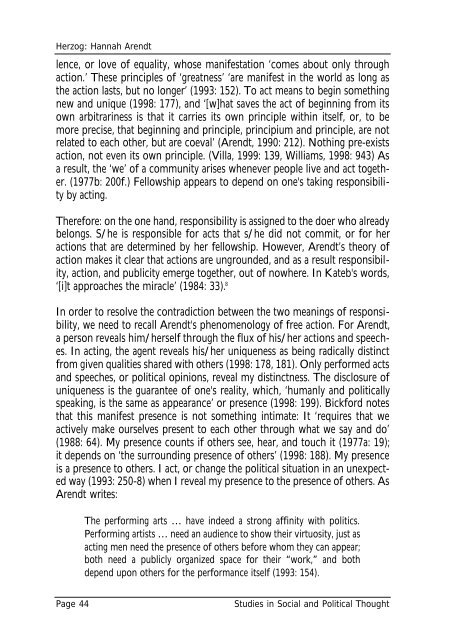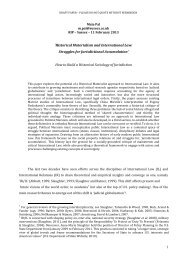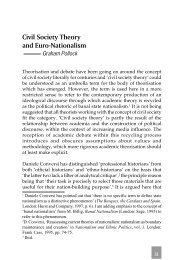Hannah Arendt's Concept of Responsibility - University of Sussex
Hannah Arendt's Concept of Responsibility - University of Sussex
Hannah Arendt's Concept of Responsibility - University of Sussex
You also want an ePaper? Increase the reach of your titles
YUMPU automatically turns print PDFs into web optimized ePapers that Google loves.
Herzog: <strong>Hannah</strong> Arendt<br />
lence, or love <strong>of</strong> equality, whose manifestation ‘comes about only through<br />
action.’ These principles <strong>of</strong> ‘greatness’ ‘are manifest in the world as long as<br />
the action lasts, but no longer’ (1993: 152). To act means to begin something<br />
new and unique (1998: 177), and ‘[w]hat saves the act <strong>of</strong> beginning from its<br />
own arbitrariness is that it carries its own principle within itself, or, to be<br />
more precise, that beginning and principle, principium and principle, are not<br />
related to each other, but are coeval’ (Arendt, 1990: 212). Nothing pre-exists<br />
action, not even its own principle. (Villa, 1999: 139, Williams, 1998: 943) As<br />
a result, the ‘we’ <strong>of</strong> a community arises whenever people live and act together.<br />
(1977b: 200f.) Fellowship appears to depend on one's taking responsibility<br />
by acting.<br />
Therefore: on the one hand, responsibility is assigned to the doer who already<br />
belongs. S/he is responsible for acts that s/he did not commit, or for her<br />
actions that are determined by her fellowship. However, Arendt’s theory <strong>of</strong><br />
action makes it clear that actions are ungrounded, and as a result responsibility,<br />
action, and publicity emerge together, out <strong>of</strong> nowhere. In Kateb's words,<br />
‘[i]t approaches the miracle’ (1984: 33). 8<br />
In order to resolve the contradiction between the two meanings <strong>of</strong> responsibility,<br />
we need to recall <strong>Arendt's</strong> phenomenology <strong>of</strong> free action. For Arendt,<br />
a person reveals him/herself through the flux <strong>of</strong> his/her actions and speeches.<br />
In acting, the agent reveals his/her uniqueness as being radically distinct<br />
from given qualities shared with others (1998: 178, 181). Only performed acts<br />
and speeches, or political opinions, reveal my distinctness. The disclosure <strong>of</strong><br />
uniqueness is the guarantee <strong>of</strong> one's reality, which, ‘humanly and politically<br />
speaking, is the same as appearance’ or presence (1998: 199). Bickford notes<br />
that this manifest presence is not something intimate: It ‘requires that we<br />
actively make ourselves present to each other through what we say and do’<br />
(1988: 64). My presence counts if others see, hear, and touch it (1977a: 19);<br />
it depends on ‘the surrounding presence <strong>of</strong> others’ (1998: 188). My presence<br />
is a presence to others. I act, or change the political situation in an unexpected<br />
way (1993: 250-8) when I reveal my presence to the presence <strong>of</strong> others. As<br />
Arendt writes:<br />
Page 44<br />
The performing arts … have indeed a strong affinity with politics.<br />
Performing artists … need an audience to show their virtuosity, just as<br />
acting men need the presence <strong>of</strong> others before whom they can appear;<br />
both need a publicly organized space for their “work,” and both<br />
depend upon others for the performance itself (1993: 154).<br />
Studies in Social and Political Thought
















